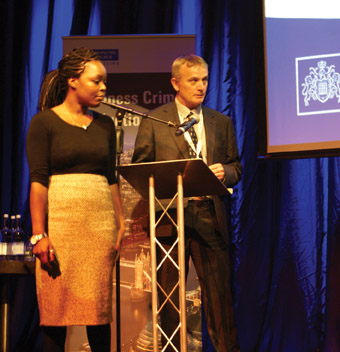The public-private work on the South Bank leaves beggars in a better place, the London business crime reduction conference on November 16 heard.
Businesses can suffer robberies, burglaries, and the streets outside can see knife and gang violence. But when a partnership in south London asked its local businesses what was their biggest crime issue, their main replies were none of these.
So Neil Haggertay, security manager of the Southbank Employers’ Group (SBEG) told the event at the Hippodrome. The biggest issue, said SBEG members – such as the National Theatre, and other landmarks around Waterloo and Blackfriars – was begging. Then street drinking, and dangerous dogs. Staffers might feel so intimidated by beggars on leaving their work, that they would retreat back to their premises. Beggars might enter the Royal Festival Hall to trawl among diners at table. Neil said: “So it’s quite right and proper that we look at these issues and then try and do some work around it.” He spoke at the event with Chantelle Gardner, project manager of the Lambeth safer streets team. Lambeth council commissioned CGL, a charity to provide outreach services to rough sleepers, typically bedded down around the tunnels at Waterloo. As for anti-social behaviour, if regular beggars, street drinkers or on-street drug users make law enforcement necessary, CGL work with police to make sure of a collaborative approach. She gave the case of an unnamed 45-year-old man, who had agreed to his (anonymised) story given publicity; after a difficult upbringing was part of a street population, begging, evicted from a hostel for violence. On coming out of prison in April 2016, he was placed in accommodation and supported to live independently and not beg.
The theme of their talk was ‘connecting the dots’. Every borough in London has ‘dots’ – aggressive beggars, rough sleepers who may urinate on the street, who don’t like to be pointed to toilets – but are the dots connected? Neil said SBEG can put together criminal behaviour order packages (CBOs being the Conservatives’ successor to Labour’s ASBOs) and given them to law enforcement. He and other speakers at the conference praised CBOs are easier to obtain than ASBOs. Or if someone is arrested, SBEG might like bail conditions attached when the offender is released, not to return to a venue or postcode. Hence the need to ‘connect the dots’, as the police might not know the offender is a problem in other places. Neil hailed CBOs and ASBOs in Lambeth for changing people’s lives. “We don’t just prosecute them, because prosecuting someone for street begging or drunkenness doesn’t actually solve the problem, but if you get a good CBO or ASBO, you are changing the conditions of their lives in a positive way, hopefully.” He said that about 60pc of people given CBOs and ASBOs from the South Bank’s joint working are now ‘in a far better place than before we started’: “If I am proud of anything it is that some of these people are now living in independent accommodation. Some of them have jobs, they are now clear of drugs, their drinking is under control compared to where it was.” The private security work includes with Home Office Immigration; because those east and central Europeans under the railway arches feel a failure if they were to go home from London. The authorities can re-connect those rough sleepers to their family or their home country, and organise their return.
More in the January 2017 print issue of Professional Security magazine. Picture by Mark Rowe; Chantelle Gardner of CGL and Neil Haggertay of SBEG speaking at the Met Police conference.










